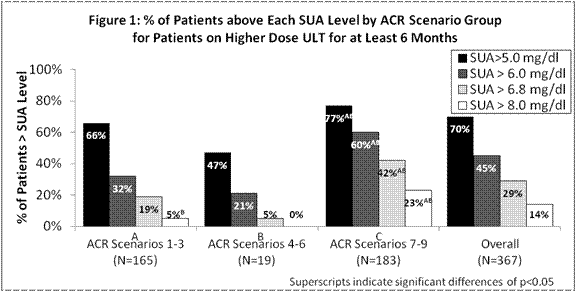Session Information
Session Type: Abstract Submissions (ACR)
Background/Purpose: In Oct 2012, the ACR published guidelines for the management of gout. These guidelines recommend pharmacologic treatment that results in a sufficient lowering of the serum urate level to durably improve signs and symptoms of gout, including palpable and visible tophi, with a target of <6 mg/dl at a minimum, and often <5 mg/dl. (Khanna et al. Arthritis Care & Research 2012; 64 10:1431-46.) The extent to which current practice among rheumatologists aligns with these guidelines is unknown, and the areas in which the guidelines may help improve gout treatment remain to be determined. Our purpose was to assess symptoms, treatment, and outcomes among gout patients treated by US rheumatologists and identify any gaps in current practice per the new ACR recommendations.
Methods: We recruited a national sample of rheumatologists to report gout patient encounters prospectively between Jan 15 and Feb 22, 2013. Anonymous patient data collected included demographics, gout symptoms, rheumatologist assessment of control, gout medications and treatment changes. We applied the ACR working case “scenarios” used in the guideline process and grouped patients by increasing severity: ACR scenarios 1-3 (intermittent symptoms, no tophi), scenarios 4-6 (intermittent symptoms, ≥ 1 tophus) and scenarios 7-9 (Chronic Tophaceous Gouty Arthropathy). We defined “Higher Dose ULT” (Urate Lowering Therapy) as >300mg/day of allopurinol or ≥80 mg/day of febuxostat.
Results: 127 rheumatologists submitted 2,380 patient encounter forms. Patients were mostly male (79%) with mean age of 61 years. 68% of encounters were ACR scenarios 1-3, 4% were 4-6 and 28% were 7-9. 24% of patients were on Higher Dose ULT. Among those on Higher Dose ULT, 50% had an SUA >6 mg/dl, including 36% in ACR scenarios 1-3, 28% in 4-6 and 68% in 7-9. Despite elevated SUA levels, 45% of encounters did not result in a dose increase or change in ULT at the visit. Figure 1 shows that many patients have an SUA >6 mg/dl, even after 6 months on Higher Dose ULT.
Conclusion: Our results suggest that a high percentage of gout patients treated by rheumatologists are not at ACR recognized treatment goals, even after 6 months on Higher Dose ULT. The new ACR treatment guidelines recommend these patients should be considered for an increase in ULT dose or other treatment change, but no change was made in nearly 1/2 of encounters. These findings indicate gout management is currently suboptimal and inadequately aggressive for many patients. Further study is needed to determine the long-term impact of the new ACR treatment guidelines.
Disclosure:
M. I. Hamburger,
Savient,
8,
Savient,
2,
Savient,
9;
M. H. Pillinger,
Takeda Pharmaceuticals,
2,
Savient Pharmaceuticals,
2;
R. Sederman,
Savient,
5;
G. Fernandez,
Savient,
3.
« Back to 2013 ACR/ARHP Annual Meeting
ACR Meeting Abstracts - https://acrabstracts.org/abstract/many-gout-patients-treated-by-rheumatologists-do-not-meet-established-treatment-goals-despite-long-term-urate-lowering-therapy-results-of-a-gout-patient-encounter-survey/

